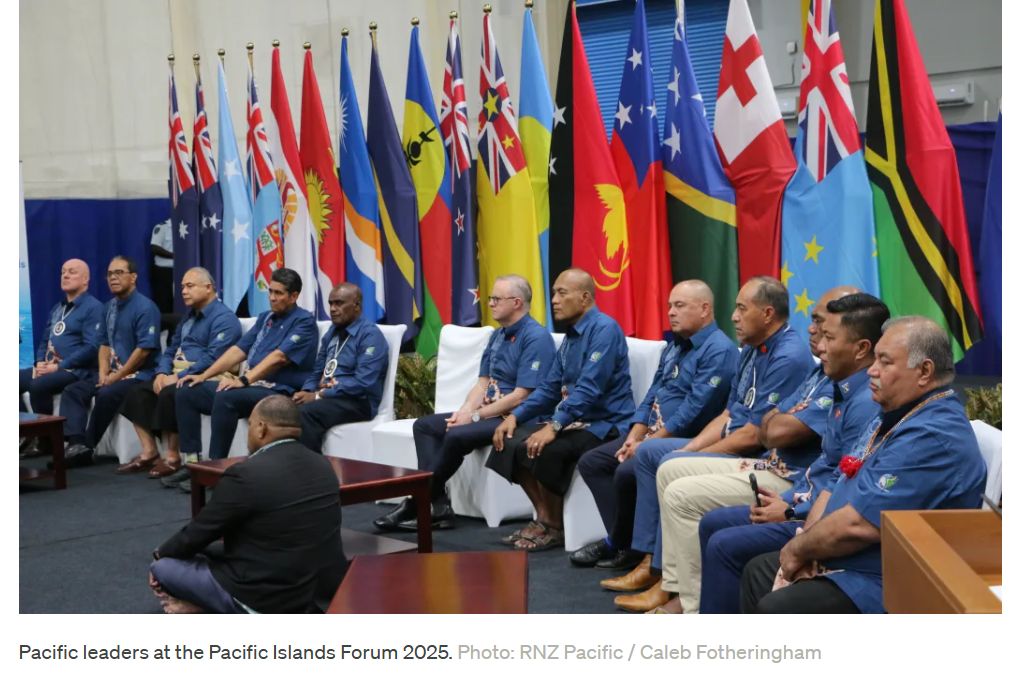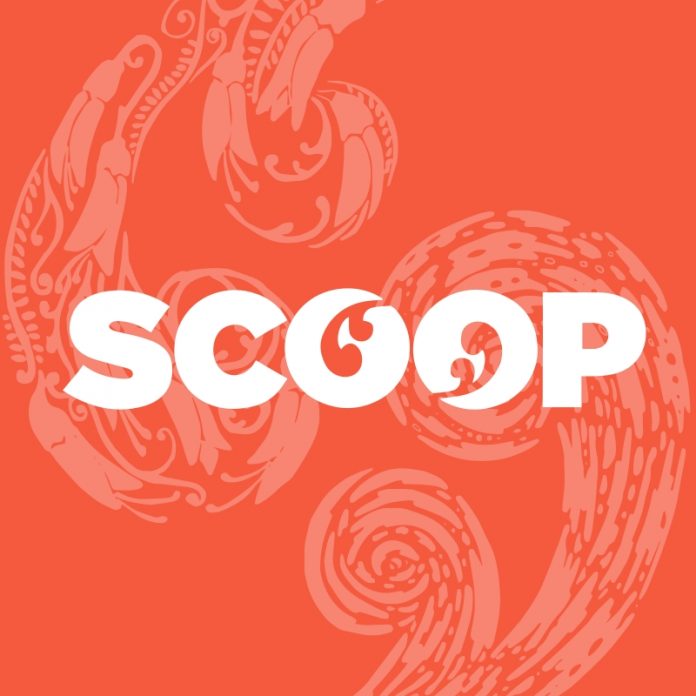Giles
Dexter, in Honiara
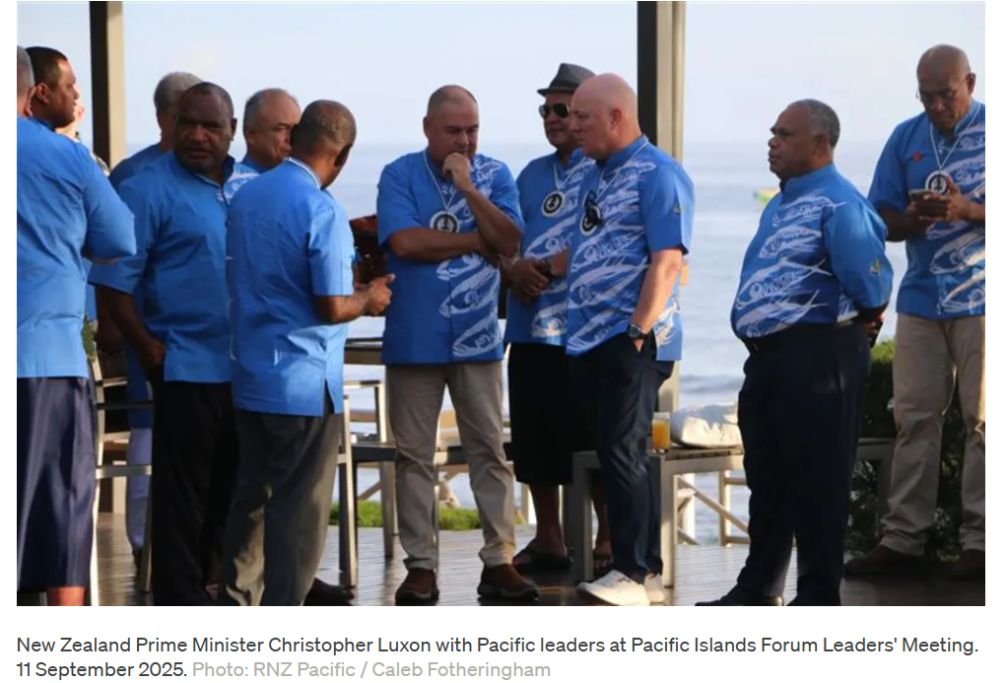
Analysis:
An imposing range of hills and ridges loom over
Honiara.
While tranquil and sparsely populated, they
were once the site of one of the most famous military
campaigns of World War II.
The Guadalcanal Campaign
saw the Allies push back against Japan, and is seen as a
turning point in the Pacific frontier of the war.
The
Battle of Bloody Ridge, in particular, resulted in heavy
losses for Japan against the United States.
It is now
the site of the Solomon Islands’ first national
park.
But some scars have been left behind.
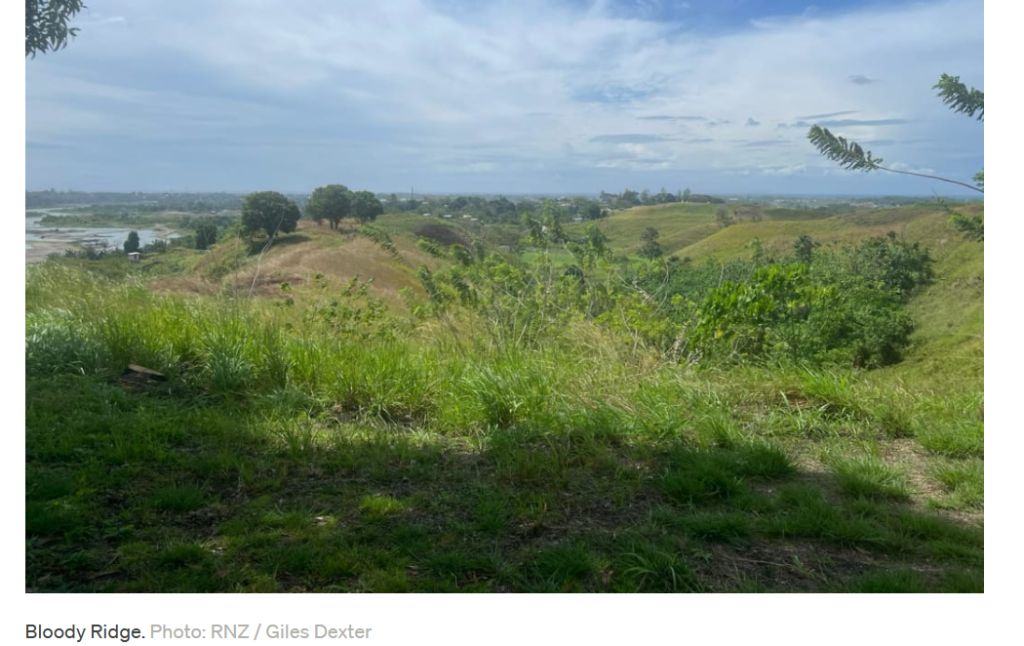
The
Halo Trust works to pinpoint and clear ‘unexploded ordnance’
around the world. It has recently expanded to the Solomon
Islands, its work funded by the US State
Department.
These mostly American and Japanese
artillery shells and grenades are still found by
unsuspecting farmers, gardeners, and
fishermen.
Despite being 80 years old, they still have
the potential to cause damage, and still serve as reminders
of a battle between major powers on an island far beyond
their borders.
Friday marks 83 years since the start
of the Battle of Bloody Ridge, while this year marks 80
years since the Japanese surrender at the end of the
war.
Advertisement – scroll to continue reading
Both anniversaries were on Solomon Islands Prime
Minister Jeremiah Manele’s mind as he introduced
a session to sign the Ocean of Peace declaration at this
year’s Pacific Islands Forum leaders meeting.
“This
declaration is a call for the Pacific to control its
destiny,” he said.
Manele, who served as this year’s
forum chair, said the declaration was forged by the hardship
sustained by the region eight decades ago.
The
declaration, introduced by Fiji’s Prime Minister Sitiveni
Rabuka, was signed
by the leaders of the forum’s 18 members.
Its
effectiveness depends on how it is
interpreted.
Christopher Luxon sees the declaration as
a framework
for more unity, a call for challenges or disagreements
to be resolved in a Pacific way, as a Pacific
family.
The future partner framework
The
phrase ‘Pacific family’ comes up a lot at the Pacific
Islands Forum (PIF).
It is usually a more casual and
friendly affair than other summits, with leaders dipping out
of plenary sessions for one-on-ones and spending time at a
private retreat to thrash through the major
issues.
The buildup to this year’s summit was
dominated by commentary around who was not here.
The
host decided
to exclude what are known as ‘dialogue partners’ –
nations or entities which are not part of PIF, but
contribute to development in the region.
The Solomon
Islands has stressed China, its significant diplomatic
partner, did
not pressure it to exclude Taiwan from the
summit.
It instead arrived at the solution to exclude
all partners, China included, while discussions on the
future of how the forum engages with its partners could be
concluded.
Its exclusion from the meeting has not
stopped China from reminding PIF of its contributions, with
the Facebook
page for the Chinese Embassy in the Solomon Islands
posting regular reminders of its investment.
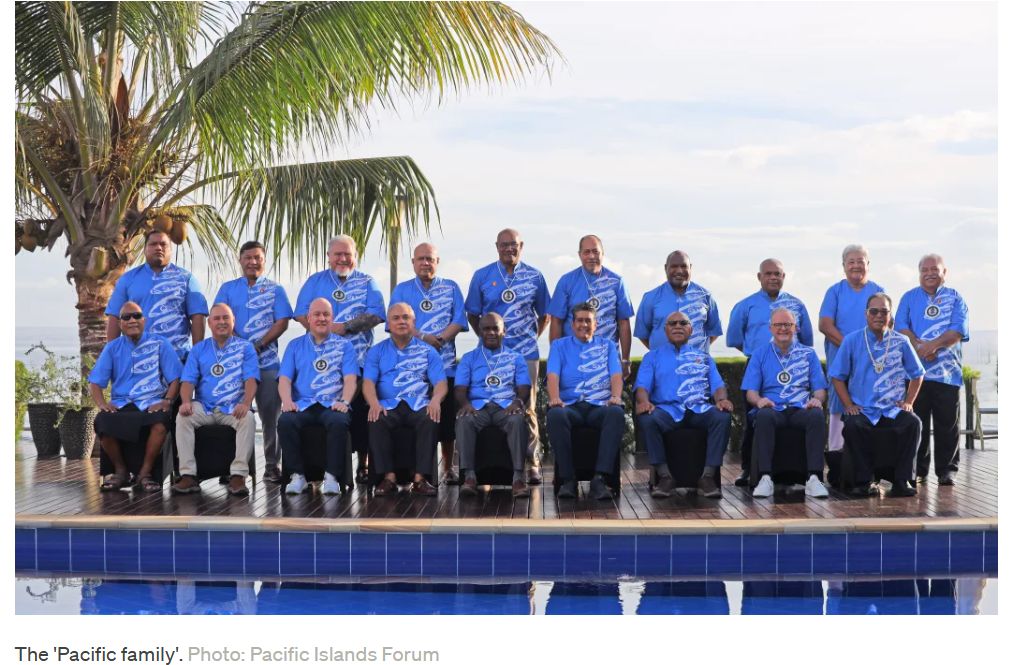
While
the official communiqué will reveal exactly what came out
of the discussions on the forum’s regional architecture, and
the rest of the agenda, it is certain that partners will be
put into two tiers, split depending on their level of
engagement.
Tier 1 partners will be those who have
development co-operation or investments that cut across all
areas of the forum’s strategy.
Tier 2 will be reserved
for partners whose contribution relates to a specific
programme.
Luxon’s vision for the future of the
framework is to plead for partners to respect PIF’s
‘centrality’ – for PIF to decide what it wants and needs,
and then talk to its partners to see if they can offer it,
rather than the dialogue partners calling the
shots.
Next year’s host, Palau – one of only a few
countries that recognises Taiwan – has already indicated all
will be welcome.
After that, it is New Zealand’s turn,
with Luxon confirming New Zealand’s bid for 2027 has
been accepted.
A closed affair
Throughout
Honiara, you can see the evidence of development
opportunities every few metres.
Infrastructure
projects carry the name of the country contributing to its
development.
An Irish education building here, an
Australian road there.
A fleet of Hyundai cars with
Republic of Korea decals sat outside the new national
stadium, the sign outside bearing a huge Chinese emblem, the
signs inside all Chinese-first.
Inside the adjacent
futsal hall, funded by Indonesia, Manele and PIF Secretary
General Baron Waqa alluded to the geostrategic competition
in the region in their opening remarks.
Media were
ushered away to the other side of the hall before Waqa could
finish speaking.
It immediately became apparent a
curtain between the two halves did little to block out what
were supposed to be candid conversations between the
leaders, and media were swiftly booted out of the hall
entirely.
Organisers need not have worried – the
acoustics meant it was impossible to tell who was speaking
or what they were saying.
Regardless, it spoke to the
tensions surrounding this year’s meeting.
The rest of
the day played out in similar overly bureaucratic fashion,
with a mix of ‘Island time’ thrown in.
Events were
delayed, locations moved, with little in the way of an
explanation why.
Blowouts throughout the day meant the
time and location of the group photo changed a number of
times.
Eventually it was moved to the evening at the
leaders’ hotel, even then it missed nature’s
deadline.
As leaders arrived from the Ocean of Peace
declaration signing, they were visibly exhausted after a
long day.
The heat, humidity, and nausea from the
antimalarial pills would not have helped.
By then the
sun had set, the moment had passed, and the chairs remained
empty.
Instead, the leaders ratified the Pacific
Resilience Facility, a fund to administer climate funding
for the region, to which New Zealand is contributing $20
million.
That signing was originally supposed to take
place six hours earlier.
Stoushes kicked to
officials
Luxon managed to make the most of being
stuck in a holding pattern, squeezing in a bilateral with
Kiribati president Taneti Maamau.
The announcement of
the bilateral was so sudden, it prompted a mad dash across
the hotel grounds, and into a tiny room behind the hotel
spa.
Four small desks shoved together was a far cry
from Luxon’s bilaterals in places like Beijing’s Great Hall
of the People, or New Delhi’s Hyderabad House.
Luxon
said the meeting was a catch-up, a first chance for the two
to sit down together.
He has clearly decided to stay
out of the spat between his foreign affairs minister and
Maamau.
Earlier this year, Winston Peters said New
Zealand would review its aid funding to Kiribati over a
perceived snub from Maamau, who Peters said had cancelled a
visit from him.
Kiribati remains the only PIF member
Peters is yet to visit.
At the forum, Maamau told
RNZ Pacific it was “unfair” that Peters had made a fuss
over not being able to visit.
Luxon has kicked that
matter back to Peters and foreign affairs
officials.
He said there “might” be an opportunity for
Peters and Maamau to meet at the United Nations General
Assembly later this month in New York.
Similarly,
Luxon spoke of a civil and friendly chat with Cook Islands
Prime Minister Mark Brown, leaving the matter of that
dispute to officials.
New Zealand has paused
development funding for the Cook Islands after Brown
signed a partnership agreement with China, without informing
New Zealand.
The two caught up at the rugby last
weekend and were seen speaking casually and collegially a
number of times at the forum.
But that
leader-to-leader engagement will not have solved the
impasse.
On Thursday morning, the group photo was the
only item on the agenda before the leaders flew out to their
retreat, and even then it was delayed.
Leaders were in
good spirits, talking and joking with each other as their
counterparts trickled in.
Luxon, doing anything to
stoke up more trans-Tasman rivalry, niggled at Australia’s
Anthony Albanese for wearing the wrong shirt at the Pacific
Resilience Facility signing, turning up in red while
everyone else wore matching blue (he later ducked out to
retrieve the correct uniform).
It seems like Albanese
got his revenge on everyone else – for the second year in a
row he kept everyone else waiting for the group
photo.
